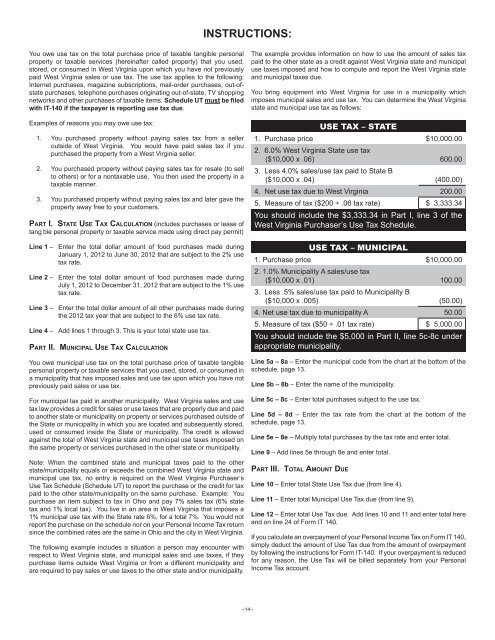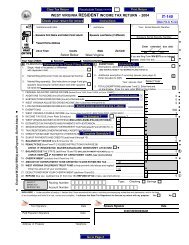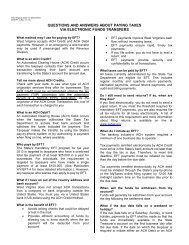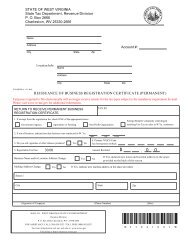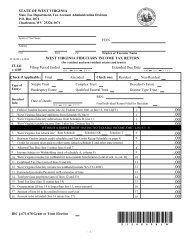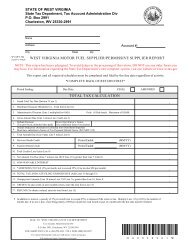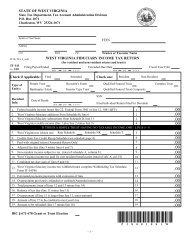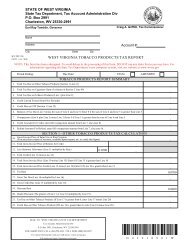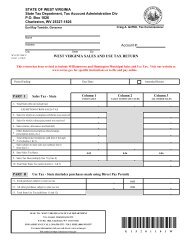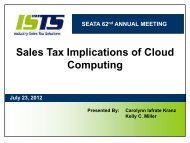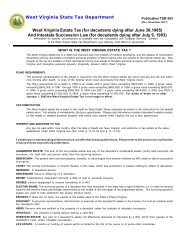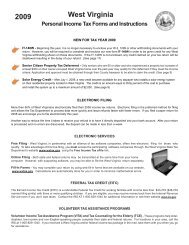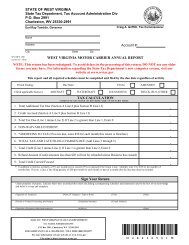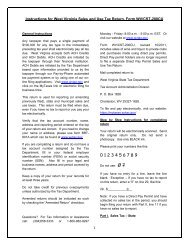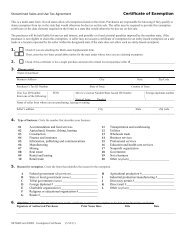Forms & instructions - State of West Virginia
Forms & instructions - State of West Virginia
Forms & instructions - State of West Virginia
Create successful ePaper yourself
Turn your PDF publications into a flip-book with our unique Google optimized e-Paper software.
INSTRUCTIONS:<br />
You owe use tax on the total purchase price <strong>of</strong> taxable tangible personal<br />
property or taxable services (hereinafter called property) that you used,<br />
stored, or consumed in <strong>West</strong> <strong>Virginia</strong> upon which you have not previously<br />
paid <strong>West</strong> <strong>Virginia</strong> sales or use tax. The use tax applies to the following:<br />
Internet purchases, magazine subscriptions, mail-order purchases, out-<strong>of</strong>state<br />
purchases, telephone purchases originating out-<strong>of</strong>-state, TV shopping<br />
networks and other purchases <strong>of</strong> taxable items. Schedule UT must be filed<br />
with IT-140 if the taxpayer is reporting use tax due.<br />
Examples <strong>of</strong> reasons you may owe use tax:<br />
1. You purchased property without paying sales tax from a seller<br />
outside <strong>of</strong> <strong>West</strong> <strong>Virginia</strong>. You would have paid sales tax if you<br />
purchased the property from a <strong>West</strong> <strong>Virginia</strong> seller.<br />
2. You purchased property without paying sales tax for resale (to sell<br />
to others) or for a nontaxable use. You then used the property in a<br />
taxable manner.<br />
3. You purchased property without paying sales tax and later gave the<br />
property away free to your customers.<br />
Part I. <strong>State</strong> Use Tax Calculation (includes purchases or lease <strong>of</strong><br />
tang ble personal property or taxable service made using direct pay permit)<br />
Line 1 – Enter the total dollar amount <strong>of</strong> food purchases made during<br />
January 1, 2012 to June 30, 2012 that are subject to the 2% use<br />
tax rate.<br />
Line 2 – Enter the total dollar amount <strong>of</strong> food purchases made during<br />
July 1, 2012 to December 31, 2012 that are subject to the 1% use<br />
tax rate.<br />
Line 3 – Enter the total dollar amount <strong>of</strong> all other purchases made during<br />
the 2012 tax year that are subject to the 6% use tax rate.<br />
Line 4 – Add lines 1 through 3. This is your total state use tax.<br />
Part II. Municipal Use Tax Calculation<br />
You owe municipal use tax on the total purchase price <strong>of</strong> taxable tangible<br />
personal property or taxable services that you used, stored, or consumed in<br />
a municipality that has imposed sales and use tax upon which you have not<br />
previously paid sales or use tax.<br />
For municipal tax paid in another municipality. <strong>West</strong> <strong>Virginia</strong> sales and use<br />
tax law provides a credit for sales or use taxes that are properly due and paid<br />
to another state or municipality on property or services purchased outside <strong>of</strong><br />
the <strong>State</strong> or municipality in which you are located and subsequently stored,<br />
used or consumed inside the <strong>State</strong> or municipality. The credit is allowed<br />
against the total <strong>of</strong> <strong>West</strong> <strong>Virginia</strong> state and municipal use taxes imposed on<br />
the same property or services purchased in the other state or municipality.<br />
Note: When the combined state and municipal taxes paid to the other<br />
state/municipality equals or exceeds the combined <strong>West</strong> <strong>Virginia</strong> state and<br />
municipal use tax, no entry is required on the <strong>West</strong> <strong>Virginia</strong> Purchaser’s<br />
Use Tax Schedule (Schedule UT) to report the purchase or the credit for tax<br />
paid to the other state/municipality on the same purchase. Example: You<br />
purchase an item subject to tax in Ohio and pay 7% sales tax (6% state<br />
tax and 1% local tax). You live in an area in <strong>West</strong> <strong>Virginia</strong> that imposes a<br />
1% municipal use tax with the <strong>State</strong> rate 6%, for a total 7%. You would not<br />
report the purchase on the schedule nor on your Personal Income Tax return<br />
since the combined rates are the same in Ohio and the city in <strong>West</strong> <strong>Virginia</strong>.<br />
The following example includes a situation a person may encounter with<br />
respect to <strong>West</strong> <strong>Virginia</strong> state, and municipal sales and use taxes, if they<br />
purchase items outside <strong>West</strong> <strong>Virginia</strong> or from a different municipality and<br />
are required to pay sales or use taxes to the other state and/or municipality.<br />
The example provides information on how to use the amount <strong>of</strong> sales tax<br />
paid to the other state as a credit against <strong>West</strong> <strong>Virginia</strong> state and municipal<br />
use taxes imposed and how to compute and report the <strong>West</strong> <strong>Virginia</strong> state<br />
and municipal taxes due.<br />
You bring equipment into <strong>West</strong> <strong>Virginia</strong> for use in a municipality which<br />
imposes municipal sales and use tax. You can determine the <strong>West</strong> <strong>Virginia</strong><br />
state and municipal use tax as follows:<br />
USE TAX – STATE<br />
1. Purchase price $10,000.00<br />
2. 6.0% <strong>West</strong> <strong>Virginia</strong> <strong>State</strong> use tax<br />
($10,000 x .06) 600.00<br />
3. Less 4.0% sales/use tax paid to <strong>State</strong> B<br />
($10,000 x .04) (400.00)<br />
4. Net use tax due to <strong>West</strong> <strong>Virginia</strong> 200.00<br />
5. Measure <strong>of</strong> tax ($200 ÷ .06 tax rate) $ 3,333.34<br />
You should include the $3,333.34 in Part I, line 3 <strong>of</strong> the<br />
<strong>West</strong> <strong>Virginia</strong> Purchaser’s Use Tax Schedule.<br />
USE TAX – MUNICIPAL<br />
1. Purchase price $10,000.00<br />
2. 1.0% Municipality A sales/use tax<br />
($10,000 x .01) 100.00<br />
3. Less .5% sales/use tax paid to Municipality B<br />
($10,000 x .005) (50.00)<br />
4. Net use tax due to municipality A 50.00<br />
5. Measure <strong>of</strong> tax ($50 ÷ .01 tax rate) $ 5,000.00<br />
You should include the $5,000 in Part II, line 5c-8c under<br />
appropriate municipality.<br />
Line 5a – 8a – Enter the municipal code from the chart at the bottom <strong>of</strong> the<br />
schedule, page 13.<br />
Line 5b – 8b – Enter the name <strong>of</strong> the municipality.<br />
Line 5c – 8c – Enter total purchases subject to the use tax.<br />
Line 5d – 8d – Enter the tax rate from the chart at the bottom <strong>of</strong> the<br />
schedule, page 13.<br />
Line 5e – 8e – Multiply total purchases by the tax rate and enter total.<br />
Line 9 – Add lines 5e through 8e and enter total.<br />
Part III. Total Amount Due<br />
Line 10 – Enter total <strong>State</strong> Use Tax due (from line 4).<br />
Line 11 – Enter total Municipal Use Tax due (from line 9).<br />
Line 12 – Enter total Use Tax due. Add lines 10 and 11 and enter total here<br />
and on line 24 <strong>of</strong> Form IT 140.<br />
If you calculate an overpayment <strong>of</strong> your Personal Income Tax on Form IT 140,<br />
simply deduct the amount <strong>of</strong> Use Tax due from the amount <strong>of</strong> overpayment<br />
by following the <strong>instructions</strong> for Form IT-140. If your overpayment is reduced<br />
for any reason, the Use Tax will be billed separately from your Personal<br />
Income Tax account.<br />
–14–


